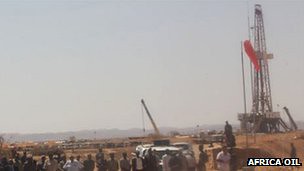
Oil drilling has begun in the breakaway northern region of Somalia known as Puntland. The imperialist intervention in the Horn of Africa nation is clearly for resources., a photo by Pan-African News Wire File Photos on Flickr.
Why Africa can’t afford to sleep
Friday, 20 July 2012 00:00
Prof Mugunda wa Ngidi
Zimbabwe Herald
BEING the custodians of vast untapped African natural resources ranging from minerals such as gold to diamonds and uranium, African leaders can befriend the United States of America at their own peril.
Confronted with an increasing Chinese presence on the continent, the US is devising methods, some of them dangerous to Africa’s prosperity, in a desperate attempt to amass as much wealth as possible for future generations, ahead of China.
The US military, therefore, becomes a handy tool as manifested through Africom, the superior military command established in 2008 specifically to subtly recolonise Africa.
Unbeknown to most Americans and people around the world, the US has been steadily increasing its military footprint in Africa.
They call it the New Spice Route, a homage to the medieval trade network that connected Europe, Africa and Asia, even if today’s “spice road” has nothing to do with cinnamon, cloves, or silks.
Instead, it’s a superpower’s superhighway, on which trucks and ships shuttle fuel, food and military equipment through a growing maritime and ground transportation infrastructure to a network of supply depots, tiny camps and airfields meant to service a fast-growing US military presence in Africa.
Few in the US know about this superhighway, or about the dozens of training missions and joint military exercises being carried out in nations that most Americans couldn’t locate on a map.
Even fewer have any idea that military officials are invoking the names of Marco Polo and the Queen of Sheba as they build a bigger military footprint in Africa.
It’s all happening in the shadows of what in a previous imperial age was known as “the Dark Continent.”
In East African ports, huge metal shipping containers arrive with the everyday necessities for a military on the make. They’re then loaded onto trucks that set off down rutted roads toward dusty bases and distant outposts.
On the highway from Djibouti to Ethiopia, for example, one can see the bare outlines of this shadow war at the truck stops where local drivers take a break from their long-haul routes.
The nodes of the network tell part of the story. Manda Bay, Garissa, and Mombasa in Kenya; Kampala and Entebbe in Uganda; Bangui and Djema in the Central African Republic; Nzara in South Sudan; Dire Dawa in Ethiopia; and the Pentagon’s showpiece African base, Camp Lemonnier, in Djibouti on the coast of the Gulf of Aden, among others.
According to Pat Barnes, a spokesman for US Africa Command (AFRICOM), Camp Lemonnier serves as the only official US base on the continent. “There are more than 2 000 US personnel stationed there,” he told TomDispatch recently by email.
“The primary AFRICOM organisation at Camp Lemonnier is Combined Joint Task Force-Horn of Africa (CJTF-HOA). CJTF-HOA’s efforts are focused in East Africa and they work with partner nations to assist them in strengthening their defence capabilities.”
Barnes also noted that Department of Defence personnel are assigned to US embassies across Africa, including 21 individual Offices of Security Co-operation responsible for facilitating military-to-military activities with “partner nations.” He characterised the forces involved as small teams carrying out pinpoint missions.
Barnes did admit that in “several locations in Africa, AFRICOM has a small and temporary presence of personnel. In all cases, these military personnel are guests within host-nation facilities, and work alongside or co-ordinate with host-nation personnel.”
Dr Mugunda Wa Ngidi is a US-based Ugandan Political scientist.
Day Africa.com
No comments:
Post a Comment